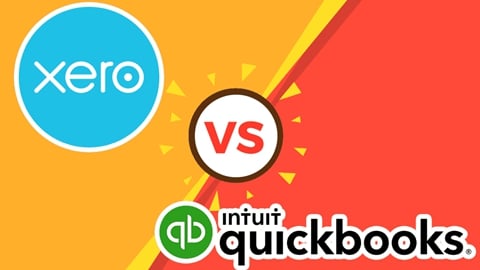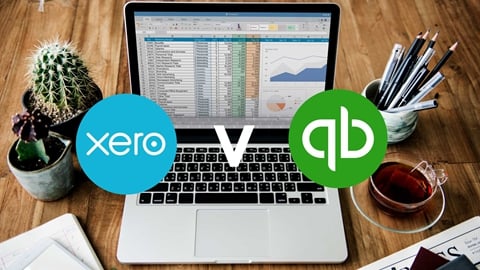
QuickBooks vs Xero: How Smart Financial Planning Drives Growth for Modern Businesses
Smart financial management has become the backbone of modern business growth. From automation to real-time insights, platforms like QuickBooks and Xero show how data-driven planning can boost efficiency, support better decisions, and keep companies moving forward.

Smart Financial Planning in the Digital Age
In today's digital business landscape, financial planning is more than just bookkeeping-it's a strategic engine for growth. From small startups to expanding enterprises, smart financial tools like QuickBooks and Xero enhance efficiency, accuracy, and transparency, becoming essential to digital transformation.
I. How Smart Financial Planning with QuickBooks and Xero Fuels Business Growth
1.Data Insights for Smarter Decisions
Modern financial platforms give businesses real-time visibility into cash flow, expenses, and income streams. By automating data synchronization and reporting, they provide leaders with actionable insights for budgeting, pricing, and forecasting.
2.Automation that Saves Time and Reduces Costs
Automation is central to digital finance. With QuickBooks and Xero handling invoices, payroll, and taxes automatically, companies can minimize errors, save time, and focus more on strategic growth.
3.Long-Term Value Through Sustainable Financial Management
Accurate forecasting and proactive risk tracking help companies identify issues early, optimize investments, and ensure long-term financial stability.

II. Comparing QuickBooks and Xero: Features, Strengths, and Key Differences
1.User Experience and Target Users
QuickBooks, developed by Intuit, focuses on depth and detailed accounting functions, perfect for businesses with established finance systems.
Xero, with its clean interface and collaborative cloud design, appeals to startups and remote teams seeking simplicity and flexibility.
2.Automation and Integration Capabilities
QuickBooks offers powerful automation for accounting and tax workflows, while Xero shines in API flexibility, allowing seamless integration with e-commerce, CRM, and SaaS platforms.
3.Financial Reporting and Visualization Tools
QuickBooks delivers advanced templates and cash flow forecasts for managerial decision-making.
Xero emphasizes real-time dashboards for quick insights into income, spending, and profit trends.
4.Pricing, Support, and Community Resources
QuickBooks charges slightly higher fees but provides extensive support and tutorials.
Xero offers flexible pricing plans and an active user community, ideal for teams preferring self-service options.
III. Choosing Between QuickBooks and Xero: Which Fits Your Business Best?
1.Business Size and Growth Stage
Startups often prefer Xero for its affordability and simplicity, while expanding companies benefit from QuickBooks' advanced analytics and scalability.
2.Remote Collaboration and Team Integration
As remote work becomes standard, Xero's cloud-native structure gives distributed teams a clear advantage.
3.Industry Needs and Compliance Requirements
Manufacturing, construction, and accounting sectors value QuickBooks for its accuracy and audit-ready reliability.
4.System Compatibility and Workflow Efficiency
Companies relying on CRM or e-commerce tools often choose Xero for its strong API ecosystem and smooth data connectivity.
Building a Growth-Ready Financial System with QuickBooks or Xero
Smart financial planning is now a cornerstone of competitiveness. QuickBooks represents robust, data-rich financial control for structured businesses, while Xero's cloud-based flexibility empowers fast-moving teams. The best choice depends on your company's size, strategy, and goals-but both platforms help turn financial management into a true growth driver.
You May Like
Miro, Notion, and Figma: How They Power Modern Collaboration
In 2025, Miro, Notion, and Figma are at the forefront of modern collaboration, helping teams visualize ideas, organize knowledge, and design projects seamlessly. These platforms boost productivity and creativity for remote and hybrid teams alike.
ClickUp vs. Asana: The Future of Team Collaboration in 2025
ClickUp and Asana continue to define how modern teams organize projects and manage workflows in 2025. Each offers unique strengths in automation, customization, and cross-department coordination, shaping the next phase of collaborative productivity and remote teamwork efficiency.
From Slack to Teams: How Communication Shapes Modern Collaboration
Communication sits at the heart of every successful team. Slack and Microsoft Teams are transforming how organizations connect, share ideas, and build workplace culture across hybrid and remote environments, setting new standards for real-time collaboration and productivity in 2025.
Notion and ClickUp: Building a Smarter Collaboration Workflow
Notion and ClickUp bring together structure and flexibility for smarter teamwork. Their combined approach to documentation, project tracking, and integration creates a seamless workflow that helps modern teams collaborate, share knowledge, and scale productivity with clarity and control.
Modern Collaboration Platforms Redefining Productivity in 2025
Collaboration platforms are evolving fast, blending creativity, communication, and automation into unified digital spaces. From project planning to real-time brainstorming, the tools shaping 2025's modern work culture are redefining what productivity means in an interconnected world.
Building Better Teams: How TalentLMS and 360Learning Empower Employee Growth
Digital learning platforms like TalentLMS and 360Learning are reshaping employee training through flexibility, collaboration, and smart learning tools-helping teams grow skills, boost productivity, and build a culture of continuous improvement.
BNPL Adoption for Retailers: Best Practices from Klarna, Affirm, and Afterpay to Drive Growth
As flexible payments reshape retail, Buy Now, Pay Later (BNPL) platforms like Klarna, Affirm, and Afterpay are helping brands boost conversions and customer loyalty. By offering shoppers more control and convenience, retailers can drive sustainable revenue growth while creating a smoother shopping experience across online and in-store channels.
How Klarna and Affirm Drive BNPL Marketing: Strategies That Boost Revenue and Conversion
Klarna and Affirm turn BNPL into a marketing growth lever, with strategies and tech stack integrations that boost retail revenue and conversions.
Optimizing Small Business Payroll Services: Lessons from Square Payroll and ADP Workforce
Small businesses enhance payroll efficiency with Square Payroll and ADP Workforce—comparing online payroll and outsourced payroll services for better processing.
LLC Formation Services vs. Online LLC Registration: What New Business Owners Should Understand
Choosing between professional LLC formation services and a simple online LLC registration can shape the long-term stability of your new business. The right approach helps you manage compliance, protect your privacy, and avoid costly mistakes as your LLC grows.